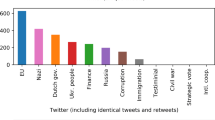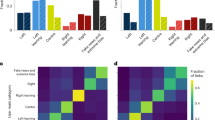Abstract
User generated media, and their influence on the information individuals are exposed to, have the potential to affect political outcomes. This is increasingly a focus for attention and concern. The British EU membership referendum provided an opportunity for researchers to explore the nature and impact of the new infosphere in a politically charged situation. This work contributes by reviewing websites that were linked in a Brexit Tweet dataset of 13.2 million tweets, by 1.8 million distinct users, collected in the run-up to the referendum. In this dataset, 480,000 users have been classified according to their “Brexit” vote intent. Findings include that linked material on Twitter was mostly posted by those in favour of leaving the EU. Mainstream news media had the greatest impact in terms of number of links tweeted, with alternative media and campaign sites appearing to a much lesser extent. Of the 15 most linked mainstream media, half show a substantially greater appeal to the leave camp, with two of them very much so. No mainstream media had a consistent appeal among remain supporters. Among the sites that were highly favoured by one voter valence or the other, the leave sites had by far the greatest impact in terms of number of appearances in tweets. Remain-preferred sites were less linked, and dominated by explicit campaign sites. Leave-preferred sites were more numerously linked, and dominated by mainstream and alternative media.
Access this chapter
Tax calculation will be finalised at checkout
Purchases are for personal use only
Similar content being viewed by others
Notes
- 1.
- 2.
- 3.
- 4.
- 5.
- 6.
- 7.
- 8.
- 9.
- 10.
References
Allcott, H., Gentzkow, M.: Social media and fake news in the 2016 election. J. Econ. Perspect. 31(2), 211–36 (2017)
Barberá, P., Rivero, G.: Understanding the political representativeness of Twitter users. Soc. Sci. Comput. Rev. 33(6), 712–729 (2015)
Bastos, M.T., Mercea, D.: The Brexit botnet and user-generated hyperpartisan news. Soc. Sci. Comput. Rev. (2017)
Faris, R., Roberts, H., Etling, B., Bourassa, N., Zuckerman, E., Benkler, Y.: Partisanship, propaganda, and disinformation: online media and the 2016 US presidential election. Berkman Klein Center for Internet & Society Research Paper (2017)
Ferrara, E.: Disinformation and social bot operations in the run up to the 2017 French presidential election. First Monday 22(8) (2017)
Higgins, K.: Post-truth: a guide for the perplexed. Nature News 540(7631), 9 (2016)
Howard, P.N., Bolsover, G., Kollanyi, B., Bradshaw, S., Neudert, L.M.: Junk news and bots during the US election: what were Michigan voters sharing over Twitter? Technical report, Data Memo 2017.1. Project on Computational Propaganda, Oxford, UK (2017)
Howard, P.N., Bradshaw, S., Kollanyi, B., Bolsolver, G.: Junk news and bots during the French presidential election: what are French voters sharing over Twitter in round two? Technical report, Data Memo 2017.4. Project on Computational Propaganda, Oxford, UK (2017)
Howard, P.N., Kollanyi, B.: Bots, #strongerin, and #brexit: computational propaganda during the UK-EU referendum. Technical report, Working Paper 2016.1. Project on Computational Propaganda, Oxford, UK (2016)
Kaminska, M., Kollanyi, B., Howard, P.N.: Junk news and bots during the 2017 UK general election: what are UK voters sharing over Twitter? Technical report, Data Memo 2017.5. Project on Computational Propaganda, Oxford, UK (2017)
Kollanyi, B., Howard, P.N.: Junk news and bots during the German federal presidency election: what were German voters sharing over Twitter? Technical report, Data Memo 2017.2. Project on Computational Propaganda, Oxford, UK (2017)
Lansdall-Welfare, T., Dzogang, F., Cristianini, N.: Change-point analysis of the public mood in UK Twitter during the Brexit referendum. In: 2016 IEEE 16th International Conference on Data Mining Workshops (ICDMW), pp. 434–439. IEEE (2016)
Mangold, L.: Should I stay or should I go: clash of opinions in the Brexit Twitter debate. Computing 1(4.1) (2016)
Maynard, D., Roberts, I., Greenwood, M.A., Rout, D., Bontcheva, K.: A framework for real-time semantic social media analysis. Web Semant. Sci. Serv. Agents World Wide Web 44, 75–88 (2017)
Moore, M., Ramsay, G.: UK media coverage of the 2016 EU referendum campaign. King’s College London (2017)
Narayanan, V., Howard, P.N., Kollanyi, B., Elswah, M.: Russian involvement and junk news during Brexit. Technical report, Data Memo 2017.10. Project on Computational Propaganda, Oxford, UK (2017)
Neudert, L.M., Kollanyi, B., Howard, P.N.: Junk news and bots during the German parliamentary election: what are German voters sharing over Twitter. Technical report, Data Memo 2017.7. Project on Computational Propaganda, Oxford, UK (2017)
Preoţiuc-Pietro, D., Liu, Y., Hopkins, D., Ungar, L.: Beyond binary labels: political ideology prediction of Twitter users. In: Proceedings of the 55th Annual Meeting of the Association for Computational Linguistics (Volume 1: Long Papers). vol. 1, pp. 729–740 (2017)
Silverman, C.: Lies, damn lies and viral content. Technical report, Tow Center for Digital Journalism (2015)
Skjeseth, H.T.: All the president’s lies: media coverage of lies in the US and France. Technical report, Reuters Institute for the Study of Journalism, University of Oxford (2017)
Vosoughi, S., Roy, D., Aral, S.: The spread of true and false news online. Science 359(6380), 1146–1151 (2018)
Acknowledgments
This work was partially supported by the European Union under grant agreements No. 687847 “Comrades” and No. 654024 “SoBigData”, the UK Engineering and Physical Sciences Research Council grant EP/I004327/1 and the British Academy under call “The Humanities and Social Sciences Tackling the UKs International Challenges”.
Author information
Authors and Affiliations
Corresponding author
Editor information
Editors and Affiliations
Rights and permissions
Copyright information
© 2018 Springer Nature Switzerland AG
About this paper
Cite this paper
Gorrell, G., Roberts, I., Greenwood, M.A., Bakir, M.E., Iavarone, B., Bontcheva, K. (2018). Quantifying Media Influence and Partisan Attention on Twitter During the UK EU Referendum. In: Staab, S., Koltsova, O., Ignatov, D. (eds) Social Informatics. SocInfo 2018. Lecture Notes in Computer Science(), vol 11185. Springer, Cham. https://doi.org/10.1007/978-3-030-01129-1_17
Download citation
DOI: https://doi.org/10.1007/978-3-030-01129-1_17
Published:
Publisher Name: Springer, Cham
Print ISBN: 978-3-030-01128-4
Online ISBN: 978-3-030-01129-1
eBook Packages: Computer ScienceComputer Science (R0)




